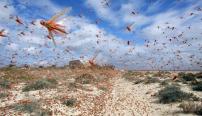Insect Explosion Threatens Food Crops
 It’s a warning of biblical proportions.
It’s a warning of biblical proportions.
Food crops could be ravaged this century by an explosion in the numbers of insect pests caused by rising global temperatures, according to scientists who have carried out an exhaustive survey of plant damage when the earth last experienced major climate change.
Researchers found that the numbers of leaf-eating insects are likely to surge as a result of rising levels of CO2. They found that, during one of the last great episodes of global warming 55.8 million years ago, there was a significant increase in both the amount of damage caused by leaf-eating insects and the variety of injuries they inflicted on plants.
They believe that the 5C rise in global temperatures caused by a tripling of CO2 levels during the palaeocene-eocene thermal maximum (PETM) period sent insect numbers soaring and left an indelible impression on the fossilised leaves preserved since that time.
Ellen Currano of Pennsylvania State University, the lead author of the study, said that although the global warming experienced during the PETM occurred tens of millions of years ago, it is still the best analogy we have for what may happen in the future.
“By looking at the fossil record, we can observe the long-term – thousands to millions of years – response of ecosystems to abrupt warming and increased atmospheric CO2,” she said. “Our study shows [that] … when temperature increases, the diversity of insect-feeding damage on plant species also increases.”
